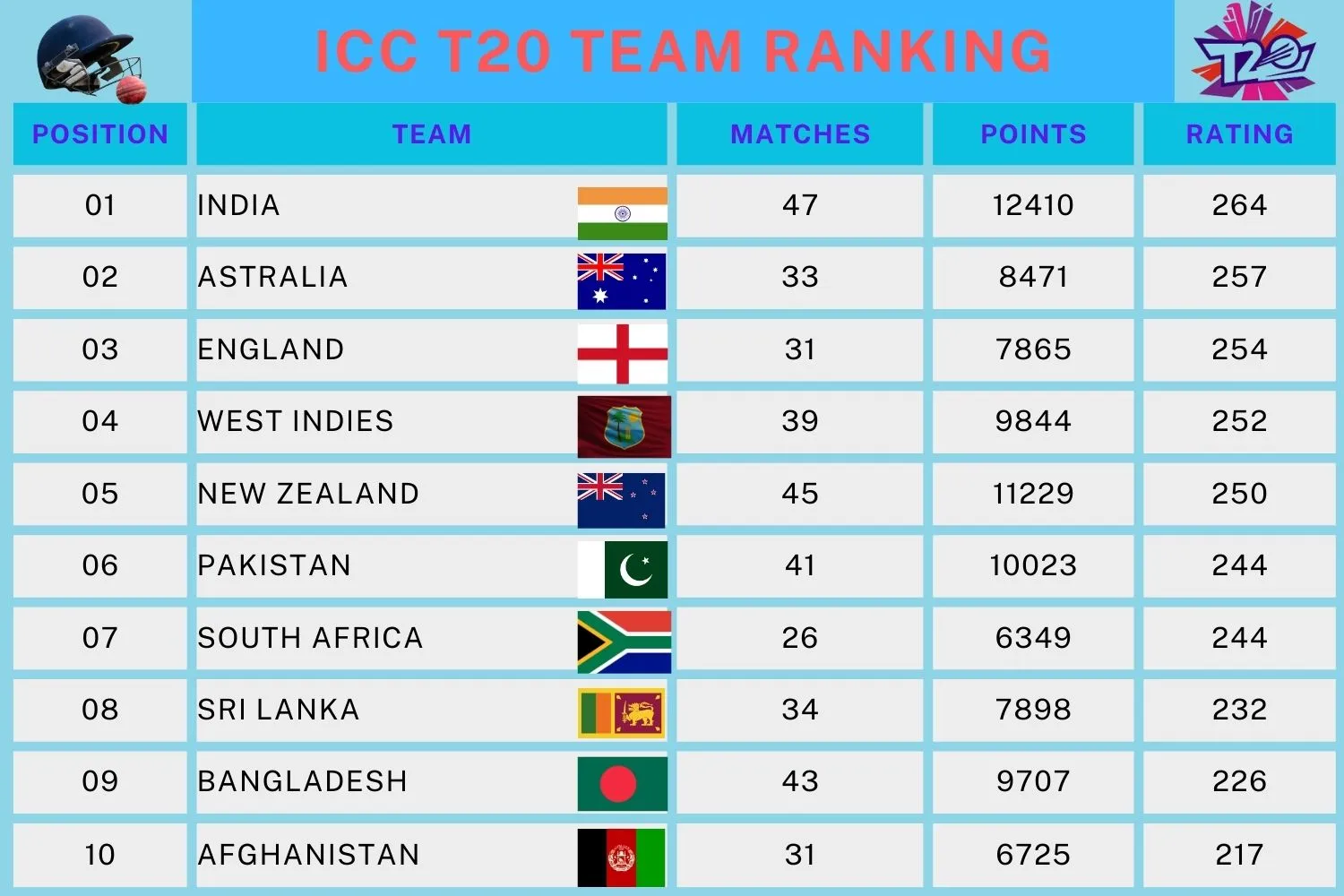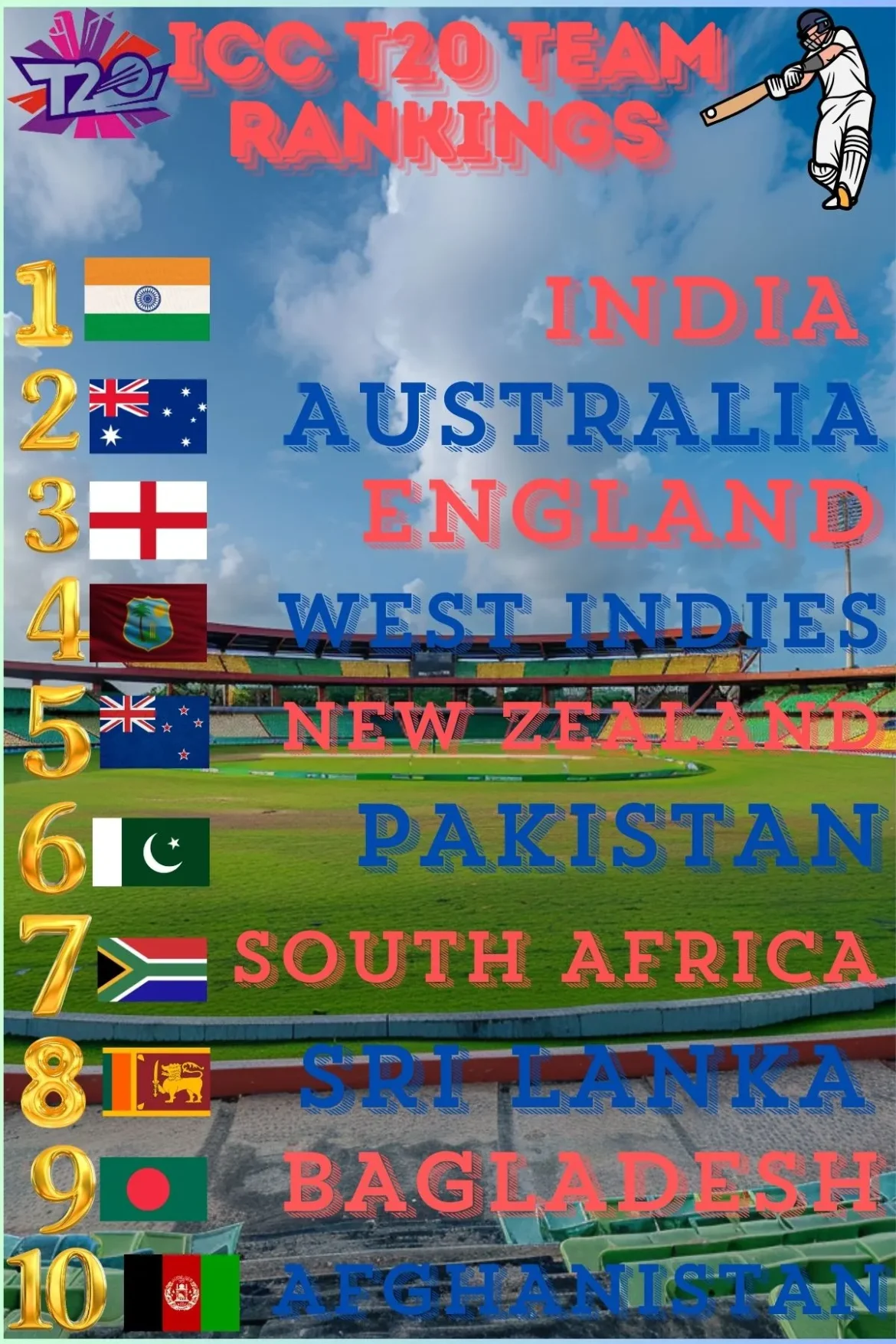“T20 Team Rankings: A Global Passion Beyond Just a Sport” – Cricket is not merely a game; it’s a global passion that binds millions of enthusiasts around the world. Among the numerous variations of cricket, Twenty20 (T20) cricket has skyrocketed in popularity due to its high-energy, exhilarating nature. The International Cricket Council’s (ICC) T20 Team Rankings serve as an essential quantitative gauge of team performances in this dynamic format. So, what makes the ICC T20 Team Rankings so significant? Let’s dive into this topic and understand its importance.
“In T20s, you don’t have time to think too much. You see the ball, you hit the ball.” – Chris Gayle
A Brief History and Significance
The ICC introduced T20 cricket in 2005, aiming to offer a shorter, more exciting version of the game. The T20 format quickly became a fan favorite, leading to the inception of the ICC T20 Team Ranking system. This ranking system is pivotal as it influences tournament seedings, team strategies, and fan expectations.
How ICC T20 Team Ranking Works
Understanding how teams are ranked in the ICC T20 system can be a bit complex but is essential for grasping the overall significance of these rankings.
Methodology and Criteria
The ICC T20 Team Ranking is based on a points system, where teams earn points from each match they play. The points are calculated considering several factors:
Match Results: Winning a match earns points, while losing deducts points.
Opposition Strength: Points earned or lost are also influenced by the ranking of the opposing team.
Match Context: Weight is given to the importance of the match, with higher stakes games such as World Cup matches carrying more weight.
Each team’s ranking is derived by dividing the total points they have earned by the number of matches they have played, providing an average score that determines their position in the ranking table.
•
Top-Ranked Teams Analysis
Let’s delve into the current top five teams in the ICC T20 Team Ranking, analyzing their recent performances and key players who have made significant impacts.

1. India
India has been a dominant force in T20 cricket, thanks to its robust batting lineup and versatile bowling attack. Recent stellar performances from players like Virat Kohli and Jasprit Bumrah have significantly contributed to their top ranking. India’s strategic approach and ability to perform under pressure make them a formidable opponent.
2. Australia
Australia’s consistent performance in t20 cricket is due to their aggressive playing style and tactical acumen. Key players like David Warner and Mitchell Starc have been instrumental in their success, making them tough competitors on any pitch.
3. England
England’s rise in T20 team rankings because the team led by dynamic players such as Jos Buttler and Jofra Archer, has excelled in executing well-planned strategies that often outplay their opponents.
4. West Indies
Renowned for their explosive batting and unorthodox bowling techniques, West Indies have made a mark in the T20 format. Power hitters like Chris Gayle and all-rounders like Kieron Pollard bring an element of unpredictability to their game, helping them secure their position in the top ranks.
5. New Zealand
New Zealand’s consistent performance in T20 cricket stems from their balanced team structure and strategic planning. With experienced players like Kane Williamson and Trent Boult leading the charge, they have become a well-rounded team capable of challenging any top-tier side.
6. Pakistan
Pakistan’s T20 prowess is highlighted by their ability to produce match-winning performances, often driven by their talented bowling attack. Players like Babar Azam and Shaheen Afridi have been crucial in securing victories, making Pakistan a strong contender in the T20 arena.
7. South Africa
South Africa boasts a team capable of extraordinary performances, known for their athleticism and sharp cricketing skills. Key figures such as Quinton de Kock and Kagiso Rabada have consistently delivered, keeping South Africa competitive in the global T20 landscape.
8. Sri Lanka
Sri Lanka’s T20 journey has seen a mix of highs and lows, but their resilience and talent are undeniable. With promising players like Wanindu Hasaranga and experienced figures like Angelo Mathews, Sri Lanka aims to rebuild and climb higher in the rankings.
9. Bangladesh
Bangladesh has shown considerable progress in T20 cricket, often punching above their weight against more established teams. All-round performers like Shakib Al Hasan have been pivotal in their recent achievements, helping them secure a spot in the top ten.
10. Afghanistan
Afghanistan’s meteoric rise in T20 cricket has been one of the most inspiring stories in the sport. Spin sensation Rashid Khan and aggressive batsmen like Mohammad Nabi have propelled the team into the top ranks, showcasing their potential on the global stage.
Impact of ICC T20 Team Ranking
The ICC T20 Team Ranking holds substantial influence over various aspects of the sport.
1- Influence on Tournaments
Rankings determine seedings in major tournaments, affecting match fixtures and the overall tournament structure. Higher-ranked teams often enjoy favorable match schedules and venues.
2- Team Strategies
Teams closely monitor their rankings and adjust strategies accordingly. A higher ranking not only boosts team morale but also puts psychological pressure on opponents.
3- Fan Expectations
High rankings often translate to increased fan support and engagement.
Conclusion
The ICC T20 Team Ranking is more than just numbers; it’s a reflection of a team’s journey, strategy, and performance. As cricket fans, staying informed about these rankings enhances our understanding and appreciation of the game.
Frequently Asked Questions:
Q1: How are the ICC T20 Team Rankings calculated?
A: The ICC T20 Team Rankings are calculated based on the team’s performance in official T20 matches. Points are awarded for each match based on the result, the strength of the opposition, and the margin of victory. These points are averaged over a specific period, typically the past 36 months, to determine the current ranking.
Q2: How often are the rankings updated?
A: The ICC T20 Team Rankings are updated after every T20 International series, ensuring that the rankings reflect the most recent performances and outcomes.
Q3: Can a team’s ranking go down even if they win a match?
A: Yes, a team’s ranking can decrease if they win against a lower-ranked team with a lesser margin than expected or if the opposing teams’ performance in other matches influences the overall ranking calculations.
Q4: Which team held the top rank for the longest period?
A: Different teams have held the top rank for varying periods depending on their performance in T20 cricket. Historically, teams like India, Australia, and England have had extended reigns at the top of the rankings due to their consistent success in the format.
Q5: What impact do rankings have on a team’s selection for major tournaments?
A: Rankings are crucial for seedings in major tournaments like the T20 World Cup. Higher-ranked teams often receive more favorable fixtures and venues, which can provide a strategic advantage in the competition.
Q6: How do player performances influence team rankings?
A: Individual performances collectively contribute to the team’s success in matches. Exceptional performances by key players in crucial matches can significantly enhance the team’s chances of winning, thereby positively influencing their ranking.
Q7: Why do rankings fluctuate so frequently in T20 cricket?
A: T20 cricket is a fast-paced, dynamic format. The shorter format means individual moments of brilliance, leading to frequent changes in the rankings based on the latest series results.



